Informationen zur Zeitschrift
Startseite » Programm » IJREE 2-2014 | UC Links: Collaborative Engagement in Extended Learning
IJREE 2-2014 | UC Links: Collaborative Engagement in Extended Learning
Erscheinungsdatum : 12.01.2015
0,00 € - 35,00 €
Inhalt
IJREE – International Journal for Research on Extended Education
2-2014: UC Links: Collaborative Engagement in Extended Learning
Main Topic
Robert Lecusay: Building Zones of Proximal Development with Computer Games in a UC Links After-school Program
Andrew Schuetze / Lorena Claeys / Belinda Bustos Flores / Shannon Sezech: La Clase Mágica as a Community Based Expansive Learning Approach to STEM Education
Marta Padrós / Sònia Sànchez-Busqués / José Luis Lalueza / Isabel Crespo: The Shere Rom Project: Looking for Alternatives to the Educational Exclusion of Roma
Beatriz Macías Gómez-Estern / Virginia Martínez-Lozano / Olga A. Vásquez: “Real Learning” in Service Learning: Lessons from La Clase Mágica in the US and Spain
Free Contributions
Claudia G. Pineda / Michael J. Nakkula: Dancing Ethnicity: A Qualitative Exploration of Immigrant Youth Agency in an Ethnically Specific Program
Marianne Schüpbach: Extended Education in Switzerland: Values in Past, Present, and Future
Anna Klerfelt / Björn Haglund: Walk-and-Talk Conversations: a Way to Elicit Children’s Perspectives and Prominent Discourses in School-Age Educare
Developments in the Field of Extended Education
Sang Hoon Bae: Values and Prospects of Extended Education: A Critical Review of the Third NEO ER Meeting
Reviews
Belinda Bustos Flores / Olga A. Vásquez / Ellen Riojas Clark: Generating Transworld Pedagogies: Reimagining La Clase Mágica
Download of Table of Contents / Inhaltsverzeichnis herunterladen
Download of single articles (Open Access/fee-based): ijree.budrich-journals.com
You can register here for the IJREE alert.
Einzelbeitrag-Download (Open Access/Gebühr): ijree.budrich-journals.com
Sie können sich hier für den IJREE-Alert anmelden.
Zusätzliche Information
| Verlag | |
|---|---|
| ISSN | 2196-3673 |
| eISSN | 2196-7423 |
| Jahrgang | 2. Jahrgang 2014 |
| Ausgabe | 2 |
| Erscheinungsdatum | 12.01.2015 |
| Umfang | 149 |
| Sprache | Englisch |
| Format | 17 x 24 cm |
| DOI | |
| Open Access-Lizenz | |
| Homepage |
Autor*innen
Schlagwörterafter-school education, after-school programs, all-day schools, children’s perspectives, collaborative engagement, collaborative learning, Colombian youth, computer games, diversity, educational exclusion, educational inclusion, ethnic identity, extended education, extended learning, higher education, immigrant youth, informal learning, Intercultural education, Latinos, narrative inquiry, pedagogy, positive youth development, proximal development, real learning, robotics, Roma education, school-age educare centres, service learning, Spain, STEM, Switzerland, The Shere Rom Project, USA
Abstracts
Building Zones of Proximal Development with Computer Games in a UC Links After-school Program (Robert Lecusay)
There is widespread agreement that further research is needed in order to identify afterschool program characteristics useful for understanding why some programs are more successful than others. The bulk of recommendations put forth by researchers, practitioners and policy makers focus on observable characteristics of the afterschool setting as a whole. While these characteristics can be recorded on checklists for later aggregation into a quantifiable evaluation of the system, it is important to remember that they are the products of interactional processes. In the present analysis I focus on the dynamic human interactions that comprise these system-level evaluations. Drawing on video documentation of adult-child computer mediated activities in a UC-Links afterschool program, I illustrate how UC-Links design principles – which focus on the creation of cultures of collaborative learning – promote the learning and development of participating youth. In particular, I show how implementation of these principles support one of the key tasks in achieving quality teachinglearning after school: the successful negotiation of a common ground of engagement between interlocutors in an instructional interaction. Keywords: Afterschool Education, Collaborative Learning, Informal Learning, Zone of Proximal Development
» Download Single Contribution Free of Charge (Budrich Journals) / Einzelbeitrag kostenlos herunterladen (Budrich Journals)
La Clase Mágica as a Community Based Expansive Learning Approach to STEM Education (Andrew Schuetze, Lorena Claeys, Belinda Bustos Flores, Shannon Sezech)
As an alternative to experimental design, using a social design experiment methodology, we analyzed the Academy for Teacher Excellence’s La Clase Mágica’s (LCM) Robotics Clubs, a university-school collaborative partnership. Given the scarcity of minority representation in the STEM fields (science, technology, engineering, and mathematics), we established robotics clubs to provide young learners, ages 5–14, with STEM opportunities to engage in playful informal learning that promotes creativity, mathematical, and scientific skills along with other forms of literacy. In this manuscript, we describe the learning process that occurs within the robotics clubs established at seven schools who serve large numbers of underserved-underrepresented populations. Multiple data sources include meeting notes, interviews, field notes, and focus groups. The use of multiple data sources, peer-review, and triangulation of the data assisted in establishing trustworthiness. We found that this community based expansive learning approach contributes to the mutual learning benefits of the different participants, learners (protégés) and undergraduate students (mentors). Keywords: Communities of Practice, Robotics, Latinos, Informal Learning, STEM
» Download Single Contribution Free of Charge (Budrich Journals) / Einzelbeitrag kostenlos herunterladen (Budrich Journals)
The Shere Rom Project: Looking for Alternatives to the Educational Exclusion of Roma (Marta Padrós, Sònia Sànchez-Busqués, José Luis Lalueza, Isabel Crespo)
School failure and early school dropout particularly affect members of certain minority groups such as the gypsy2 population. The obstacles that must be overcome for the members of these groups appear to be related to the discontinuities between the values and goals of community family life and those of the school. This article presents an analysis of obstacles based on the perception of gypsy families and other minority groups who don’t have the same difficulties. The findings of this study help to analyze and understand the characteristics that promote the inclusion through extended education communities based on the Fifth Dimension model within the framework of a project developed in Barcelona with the gypsy and immigrant population. Keywords: Intercultural education, communities of practice, Roma education, extended education, educational inclusion
» Download Single Contribution Free of Charge (Budrich Journals) / Einzelbeitrag kostenlos herunterladen (Budrich Journals)
“Real Learning” in Service Learning: Lessons from La Clase Mágica in the US and Spain (Beatriz Macías Gómez-Estern, Virginia Martínez-Lozano, Olga A. Vásquez)
In this article, we present initial findings of an exploratory-pilot research study that focuses on service learning as a framework to examine “real learning” and identity changes of university students participating in a community based educational activity known as La Clase Mágica. Student’s reports and fieldnotes from two distinct locations: the original 25-year old project located in San Diego, California and a recent adaptation in Seville known as LCM-Seville, now completing two academic years of experience. The two programs in San Diego (US) and Seville (Spain) illustrate the types of learning that students acquire as they engage community members in activities that support community participants’ development. Keywords: service learning, real learning, narrative inquiry, diversity, higher education
» Download Single Contribution Free of Charge (Budrich Journals) / Einzelbeitrag kostenlos herunterladen (Budrich Journals)
Dancing Ethnicity: A Qualitative Exploration of Immigrant Youth Agency in an Ethnically Specific Program (Claudia G. Pineda, Michael J. Nakkula)
This article addresses a conceptual gap in the Out-of-School Time literature by offering a framework to study the relationship between ethno-cultural components in programs focused on youth ethnic culture (ESPs) and ethnic identity development among longterm participants. Using qualitative methodologies, it examined the meaning-making of eight Colombian immigrant youth participants in ColDance, an after-school program focused on Colombian culture in Boston. Findings suggest ColDance played a powerful role in fostering a positive connection with youth’s ethnic heritage crystallized in tangible dancing skills and specific knowledge about Colombian traditions. It provided and nurtured cultural brokers who eased youth’s adaptation process. Further, it suggests that a performance-oriented program may expose youth to receptive audiences that function as social mirrors fostering positive self-concepts. Keywords: After-school programs, ethnic identity, immigrant youth, Colombian youth, positive youth development
» Download Single Contribution Free of Charge (Budrich Journals) / Einzelbeitrag kostenlos herunterladen (Budrich Journals)
Extended Education in Switzerland: Values in Past, Present, and Future (Marianne Schüpbach)
It is only in recent years that extended education has been a topic of broader public interest in Switzerland. The impetuses for extended education were changes in social and family conditions, and PISA 2000. In 2007 under the HarmoS Intercantonal Agreement on Harmonization of Compulsory Schooling in Switzerland, all cantons that adopted the HarmoS Agreement are obligated to provide extended education offerings meeting the needs of children and to introduce canton-wide core times. The developments in recent years in two trailblazing cantons – Basel-Stadt and Bern – presented as examples will most likely show the way forward for the further development and expansion of extended education across Switzerland. This means that in the future, in addition to quantitative expansion there will probably be a main focus on qualitative expansion of extended education. In a long-term perspective, there may be a development in the direction of all-day school scheduling for all students: schools with all-day hours as the normal case. Keywords: Extended education, all-day school, development, value, Switzerland
» Download Single Contribution Free of Charge (Budrich Journals) / Einzelbeitrag kostenlos herunterladen (Budrich Journals)
Walk-and-Talk Conversations: a Way to Elicit Children’s Perspectives and Prominent Discourses in School-Age Educare (Anna Klerfelt, Björn Haglund)
This article highlights the discourses of children and leisure-time pedagogues regarding ways the activity at two different Swedish school-age educare centres are mutually constructed. Two different topics are stressed: children’s perspectives and school-age educare centres as a social and educational practice. Data was constructed through walkand- talk conversations supported by photos from a digital camera. The results are described through narratives that depict the children’s discourses in their school-age educare activity. The emerging discourses show that children’s perspectives are met in several ways but also that their perspectives are, in some respects, ignored. These results have the potential to contribute by helping to make children’s voices heard as a tool to change the social practices in school-age educare centres. Keywords: Walk-and-talk conversations, school-age educare centres, children’s perspectives, discourse, narrative
» Download Single Contribution Free of Charge (Budrich Journals) / Einzelbeitrag kostenlos herunterladen (Budrich Journals)
Inhalt
Inhalt
IJREE – International Journal for Research on Extended Education
2-2014: UC Links: Collaborative Engagement in Extended Learning
Main Topic
Robert Lecusay: Building Zones of Proximal Development with Computer Games in a UC Links After-school Program
Andrew Schuetze / Lorena Claeys / Belinda Bustos Flores / Shannon Sezech: La Clase Mágica as a Community Based Expansive Learning Approach to STEM Education
Marta Padrós / Sònia Sànchez-Busqués / José Luis Lalueza / Isabel Crespo: The Shere Rom Project: Looking for Alternatives to the Educational Exclusion of Roma
Beatriz Macías Gómez-Estern / Virginia Martínez-Lozano / Olga A. Vásquez: “Real Learning” in Service Learning: Lessons from La Clase Mágica in the US and Spain
Free Contributions
Claudia G. Pineda / Michael J. Nakkula: Dancing Ethnicity: A Qualitative Exploration of Immigrant Youth Agency in an Ethnically Specific Program
Marianne Schüpbach: Extended Education in Switzerland: Values in Past, Present, and Future
Anna Klerfelt / Björn Haglund: Walk-and-Talk Conversations: a Way to Elicit Children’s Perspectives and Prominent Discourses in School-Age Educare
Developments in the Field of Extended Education
Sang Hoon Bae: Values and Prospects of Extended Education: A Critical Review of the Third NEO ER Meeting
Reviews
Belinda Bustos Flores / Olga A. Vásquez / Ellen Riojas Clark: Generating Transworld Pedagogies: Reimagining La Clase Mágica
Download of Table of Contents / Inhaltsverzeichnis herunterladen
Download of single articles (Open Access/fee-based): ijree.budrich-journals.com
You can register here for the IJREE alert.
Einzelbeitrag-Download (Open Access/Gebühr): ijree.budrich-journals.com
Sie können sich hier für den IJREE-Alert anmelden.
Bibliografie
Zusätzliche Information
| Verlag | |
|---|---|
| ISSN | 2196-3673 |
| eISSN | 2196-7423 |
| Jahrgang | 2. Jahrgang 2014 |
| Ausgabe | 2 |
| Erscheinungsdatum | 12.01.2015 |
| Umfang | 149 |
| Sprache | Englisch |
| Format | 17 x 24 cm |
| DOI | |
| Open Access-Lizenz | |
| Homepage |
Produktsicherheit
Bewertungen (0)
Bewertungen
Es gibt noch keine Bewertungen.
Autor*innen
Autor*innen
Schlagwörter
Schlagwörterafter-school education, after-school programs, all-day schools, children’s perspectives, collaborative engagement, collaborative learning, Colombian youth, computer games, diversity, educational exclusion, educational inclusion, ethnic identity, extended education, extended learning, higher education, immigrant youth, informal learning, Intercultural education, Latinos, narrative inquiry, pedagogy, positive youth development, proximal development, real learning, robotics, Roma education, school-age educare centres, service learning, Spain, STEM, Switzerland, The Shere Rom Project, USA
Abstracts
Abstracts
Building Zones of Proximal Development with Computer Games in a UC Links After-school Program (Robert Lecusay)
There is widespread agreement that further research is needed in order to identify afterschool program characteristics useful for understanding why some programs are more successful than others. The bulk of recommendations put forth by researchers, practitioners and policy makers focus on observable characteristics of the afterschool setting as a whole. While these characteristics can be recorded on checklists for later aggregation into a quantifiable evaluation of the system, it is important to remember that they are the products of interactional processes. In the present analysis I focus on the dynamic human interactions that comprise these system-level evaluations. Drawing on video documentation of adult-child computer mediated activities in a UC-Links afterschool program, I illustrate how UC-Links design principles – which focus on the creation of cultures of collaborative learning – promote the learning and development of participating youth. In particular, I show how implementation of these principles support one of the key tasks in achieving quality teachinglearning after school: the successful negotiation of a common ground of engagement between interlocutors in an instructional interaction. Keywords: Afterschool Education, Collaborative Learning, Informal Learning, Zone of Proximal Development
» Download Single Contribution Free of Charge (Budrich Journals) / Einzelbeitrag kostenlos herunterladen (Budrich Journals)
La Clase Mágica as a Community Based Expansive Learning Approach to STEM Education (Andrew Schuetze, Lorena Claeys, Belinda Bustos Flores, Shannon Sezech)
As an alternative to experimental design, using a social design experiment methodology, we analyzed the Academy for Teacher Excellence’s La Clase Mágica’s (LCM) Robotics Clubs, a university-school collaborative partnership. Given the scarcity of minority representation in the STEM fields (science, technology, engineering, and mathematics), we established robotics clubs to provide young learners, ages 5–14, with STEM opportunities to engage in playful informal learning that promotes creativity, mathematical, and scientific skills along with other forms of literacy. In this manuscript, we describe the learning process that occurs within the robotics clubs established at seven schools who serve large numbers of underserved-underrepresented populations. Multiple data sources include meeting notes, interviews, field notes, and focus groups. The use of multiple data sources, peer-review, and triangulation of the data assisted in establishing trustworthiness. We found that this community based expansive learning approach contributes to the mutual learning benefits of the different participants, learners (protégés) and undergraduate students (mentors). Keywords: Communities of Practice, Robotics, Latinos, Informal Learning, STEM
» Download Single Contribution Free of Charge (Budrich Journals) / Einzelbeitrag kostenlos herunterladen (Budrich Journals)
The Shere Rom Project: Looking for Alternatives to the Educational Exclusion of Roma (Marta Padrós, Sònia Sànchez-Busqués, José Luis Lalueza, Isabel Crespo)
School failure and early school dropout particularly affect members of certain minority groups such as the gypsy2 population. The obstacles that must be overcome for the members of these groups appear to be related to the discontinuities between the values and goals of community family life and those of the school. This article presents an analysis of obstacles based on the perception of gypsy families and other minority groups who don’t have the same difficulties. The findings of this study help to analyze and understand the characteristics that promote the inclusion through extended education communities based on the Fifth Dimension model within the framework of a project developed in Barcelona with the gypsy and immigrant population. Keywords: Intercultural education, communities of practice, Roma education, extended education, educational inclusion
» Download Single Contribution Free of Charge (Budrich Journals) / Einzelbeitrag kostenlos herunterladen (Budrich Journals)
“Real Learning” in Service Learning: Lessons from La Clase Mágica in the US and Spain (Beatriz Macías Gómez-Estern, Virginia Martínez-Lozano, Olga A. Vásquez)
In this article, we present initial findings of an exploratory-pilot research study that focuses on service learning as a framework to examine “real learning” and identity changes of university students participating in a community based educational activity known as La Clase Mágica. Student’s reports and fieldnotes from two distinct locations: the original 25-year old project located in San Diego, California and a recent adaptation in Seville known as LCM-Seville, now completing two academic years of experience. The two programs in San Diego (US) and Seville (Spain) illustrate the types of learning that students acquire as they engage community members in activities that support community participants’ development. Keywords: service learning, real learning, narrative inquiry, diversity, higher education
» Download Single Contribution Free of Charge (Budrich Journals) / Einzelbeitrag kostenlos herunterladen (Budrich Journals)
Dancing Ethnicity: A Qualitative Exploration of Immigrant Youth Agency in an Ethnically Specific Program (Claudia G. Pineda, Michael J. Nakkula)
This article addresses a conceptual gap in the Out-of-School Time literature by offering a framework to study the relationship between ethno-cultural components in programs focused on youth ethnic culture (ESPs) and ethnic identity development among longterm participants. Using qualitative methodologies, it examined the meaning-making of eight Colombian immigrant youth participants in ColDance, an after-school program focused on Colombian culture in Boston. Findings suggest ColDance played a powerful role in fostering a positive connection with youth’s ethnic heritage crystallized in tangible dancing skills and specific knowledge about Colombian traditions. It provided and nurtured cultural brokers who eased youth’s adaptation process. Further, it suggests that a performance-oriented program may expose youth to receptive audiences that function as social mirrors fostering positive self-concepts. Keywords: After-school programs, ethnic identity, immigrant youth, Colombian youth, positive youth development
» Download Single Contribution Free of Charge (Budrich Journals) / Einzelbeitrag kostenlos herunterladen (Budrich Journals)
Extended Education in Switzerland: Values in Past, Present, and Future (Marianne Schüpbach)
It is only in recent years that extended education has been a topic of broader public interest in Switzerland. The impetuses for extended education were changes in social and family conditions, and PISA 2000. In 2007 under the HarmoS Intercantonal Agreement on Harmonization of Compulsory Schooling in Switzerland, all cantons that adopted the HarmoS Agreement are obligated to provide extended education offerings meeting the needs of children and to introduce canton-wide core times. The developments in recent years in two trailblazing cantons – Basel-Stadt and Bern – presented as examples will most likely show the way forward for the further development and expansion of extended education across Switzerland. This means that in the future, in addition to quantitative expansion there will probably be a main focus on qualitative expansion of extended education. In a long-term perspective, there may be a development in the direction of all-day school scheduling for all students: schools with all-day hours as the normal case. Keywords: Extended education, all-day school, development, value, Switzerland
» Download Single Contribution Free of Charge (Budrich Journals) / Einzelbeitrag kostenlos herunterladen (Budrich Journals)
Walk-and-Talk Conversations: a Way to Elicit Children’s Perspectives and Prominent Discourses in School-Age Educare (Anna Klerfelt, Björn Haglund)
This article highlights the discourses of children and leisure-time pedagogues regarding ways the activity at two different Swedish school-age educare centres are mutually constructed. Two different topics are stressed: children’s perspectives and school-age educare centres as a social and educational practice. Data was constructed through walkand- talk conversations supported by photos from a digital camera. The results are described through narratives that depict the children’s discourses in their school-age educare activity. The emerging discourses show that children’s perspectives are met in several ways but also that their perspectives are, in some respects, ignored. These results have the potential to contribute by helping to make children’s voices heard as a tool to change the social practices in school-age educare centres. Keywords: Walk-and-talk conversations, school-age educare centres, children’s perspectives, discourse, narrative
» Download Single Contribution Free of Charge (Budrich Journals) / Einzelbeitrag kostenlos herunterladen (Budrich Journals)




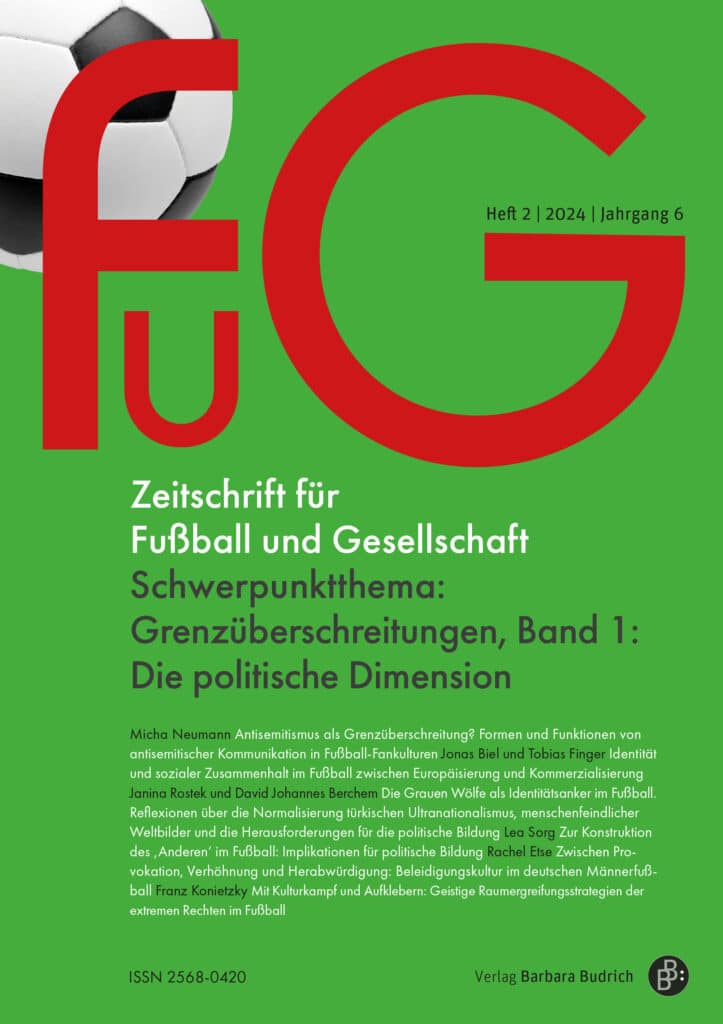
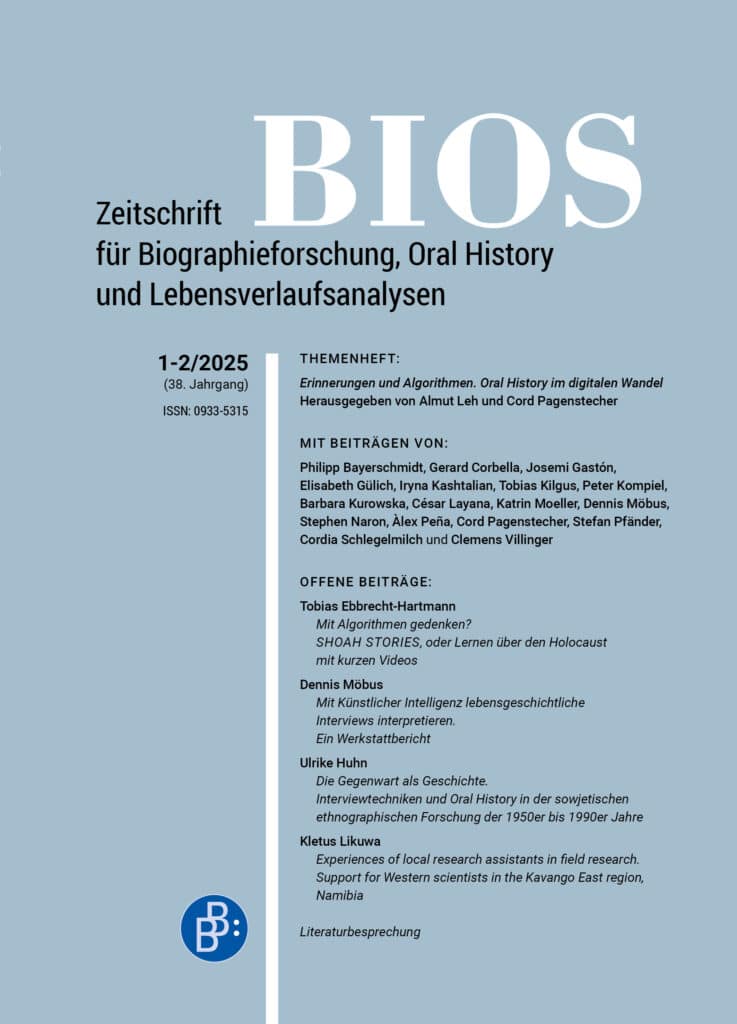
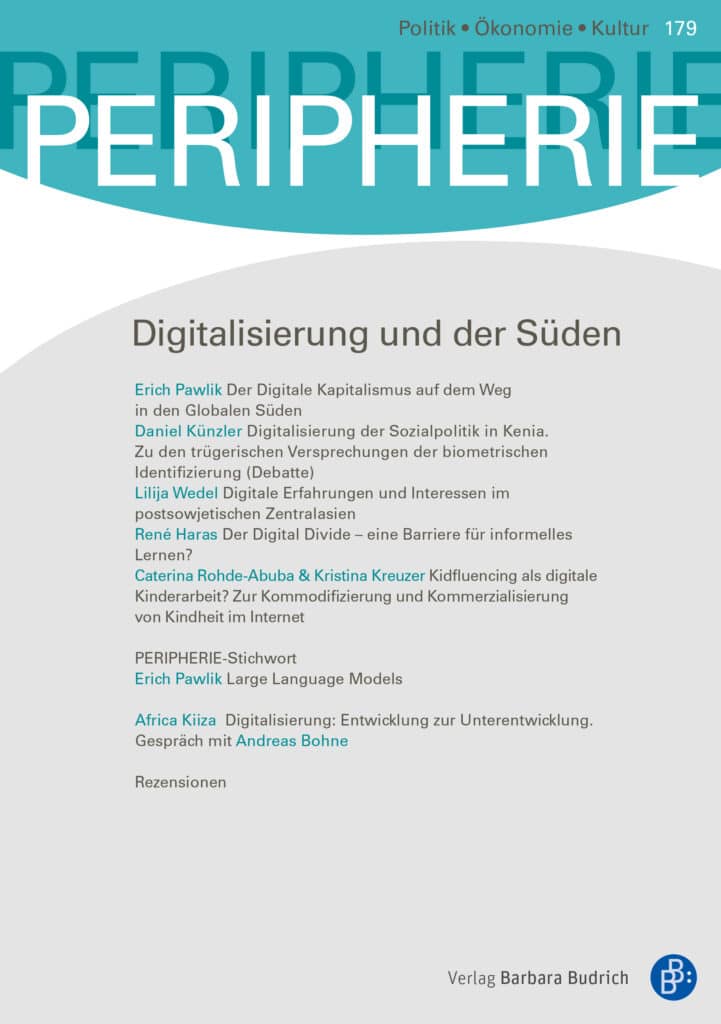
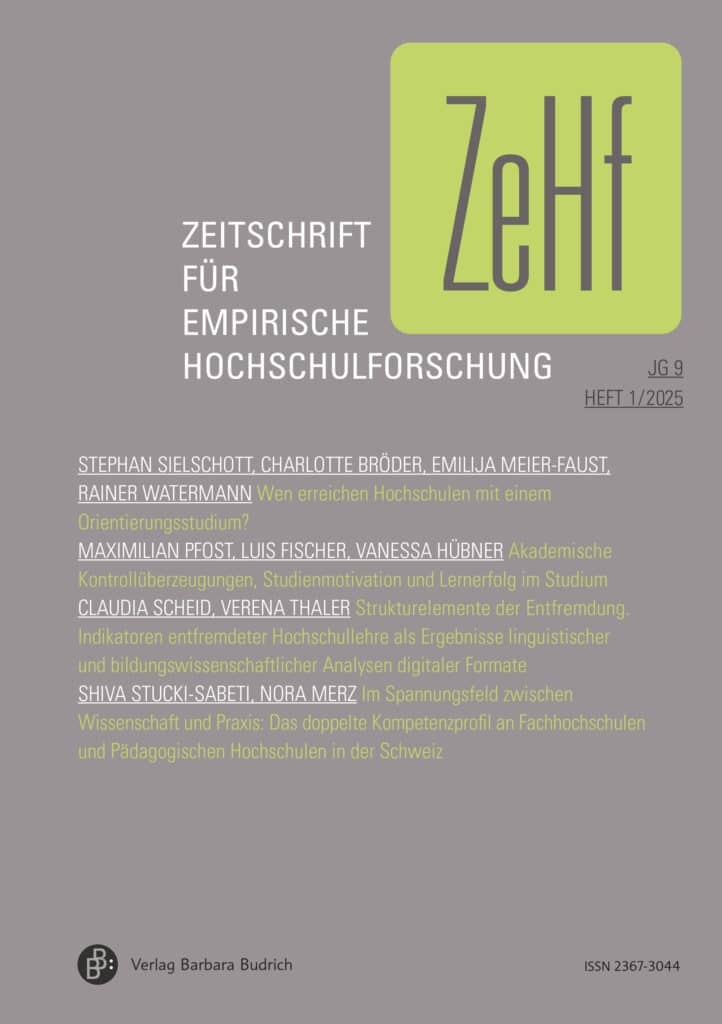
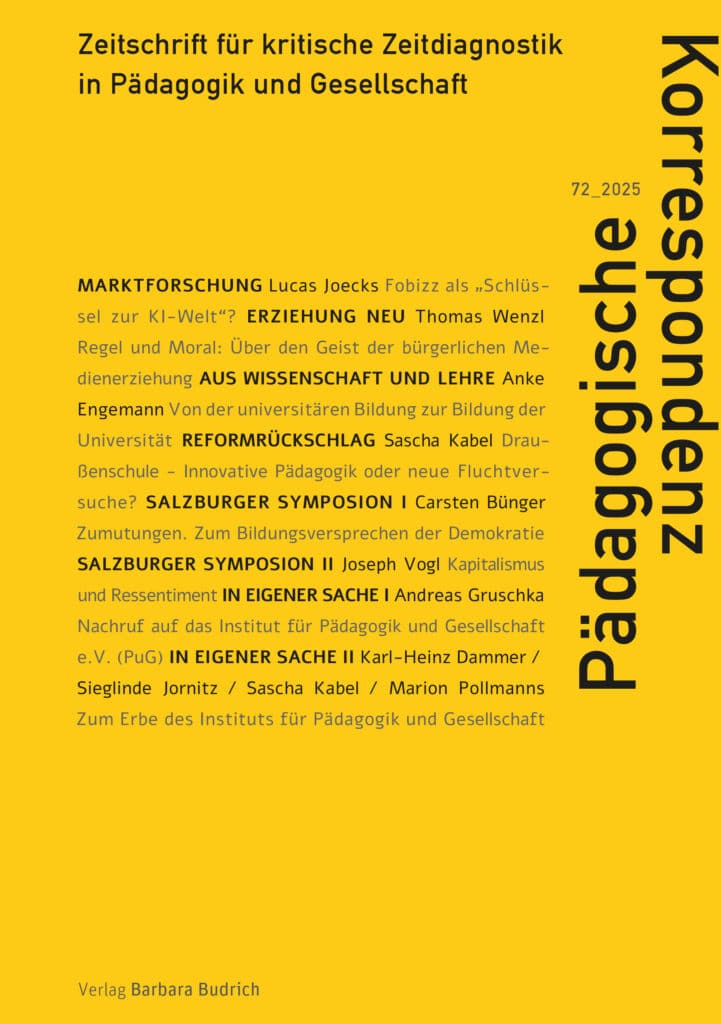

Bewertungen
Es gibt noch keine Bewertungen.